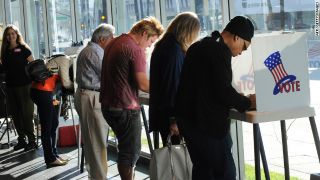Motivation
“Economic Man” Wouldn’t Vote, But Humans Do
Democracy is possible thanks to our social natures.
Posted November 5, 2012

About a decade and a half ago, the MacArthur Foundation began to support a loosely organized network of scholars in economics and other social sciences whose goal was to discuss the assumptions about human motivation on which economic models typically rest. The idea was to see whether those assumptions needed to be expanded, both to better account for important human actions and to think outside the box on addressing social problems. I remember an early position paper written for the network that listed key examples of where the standard assumption that people care only about their own material well-being is refuted by everyday experience. Among these key examples was something tens of millions of Americans will do tomorrow: going to a polling place to vote.
We tend to think of voting, especially in a year like this one, as something thoroughly infused with economic motivation. Indeed, it’s the twentieth anniversary of Bill Clinton’s successful “it’s the economy, stupid” election campaign, and “explainer-in-chief” Clinton is out on the hustings again. Alongside President Obama, he’s urging Americans not to go back to the economic approach that Democrats contend caused the crisis we’re still struggling to climb out of. Republican challenger Mitt Romney reminds voters over and over that he knows how to run a business and is therefore the right one to lead us out of the mess.*
But if you ask an economist who’s steeped in economic theory, she’ll tell you that going to the polls is a quixotic violation of the principles of rational choice. That’s because there’s always some cost, however modest, in getting oneself to the poll instead of doing something else with whatever time this takes you. And rationality requires that we take on such costs only when there’s an offsetting benefit. Even if election of Obama or of Romney will be good for your pocketbook, that doesn’t justify the costs involved in voting, since the likelihood that your individual vote will have an effect on the outcome is vanishingly small. When’s the last time you heard of an election being decided by a margin of 1 vote? In U.S. presidential and congressional races, margins of a few hundred votes are considered razor thin, but even in such tight contests, no one voter literally tips the outcome towards her candidate. The same candidate would have won, with or without her vote. Even if candidate Jane’s victory is good for Voter Joe’s pocketbook, it would have happened (or not happened) with or without him, and he’d have helped his pocketbook more by saving on the gasoline or bus fare and spending the time instead earning an extra dime, finding a better sale, or balancing his checkbook.
So why do we vote? If you’re a rationalist but not an economist, your “inner Kant” is probably jumping up and down, just about here, protesting that the last paragraph has it all wrong. If everyone reasoned that their vote made no difference, no one would vote, including the few hundred who provided that razor-thin margin. What’s right, our Kantian conscience says, is for us to do what we would want others to do, and if everyone acts accordingly, then by golly, we’ll have an election and the most preferred candidate will win.
This logic is appealing, but not to our self-interest in the narrow sense of Homo economicus or “selfish economic man.” It appeals, rather, to our group animal or social natures, as discussed by authors like E. O. Wilson, Frans de Waal, Jonathan Haidt, and in my book, The Good, The Bad, and The Economy. We see ourselves as members of groups, and we’re prepared to involve ourselves in the affairs of the group, sometimes even contrary to the most individualistic of logics.
Without our social natures, democratically accountable government would be impossible. Not only would individuals save time and money by not voting and by never volunteering to help political campaigns. They’d also not waste time learning about political issues and the views of candidates, and there’d be no financial leg for journalism to stand on, since there’d be no readership for newspapers and magazines, no audience for radio and television news. The only feasible check on governmental corruption would be paid monitoring, which would itself be corrupt without layer upon layer of counter-monitoring. The buck would stop nowhere, since there’d be no one acting on any motive other than the chasing of that almighty buck.
Unfortunately, economic calculus does affect voting on the margins. The more economically successful can more easily afford the time and means of transport to get to the polls, even the time to study up on the issues, and this more than anything explains why they vote in larger numbers. This also explains why the political right works to make voting more difficult, and why the left puts so much emphasis on its “ground game.”
Go to your polling place tomorrow, if you haven’t voted already. And when you do, then even if you’re planning to vote for the candidate you think best for your pocketbook, thank your lucky stars that you’re part of a socially minded species and that there’s something about us that makes us care about our roles as members of a group, and not single-mindedly and only about ourselves. We’re able to use government to protect our rights, health, security, and property, only because we’re inclined to think as members of groups, whether we’re exercising our tendencies to put ourselves first or fixing our gazes on the betterment of our society.
* I discussed some ways in which voting is affected by non-economic or non-selfish considerations in a recent posting, American Politics and The Two Faces of Fairness.


